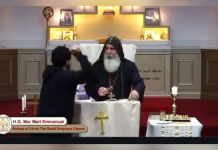After the high drama of the Church of England’s General Synod, we had one day to wash and repack before flying to Ghana for the eighteenth plenary meeting of the Anglican Consultative Council (ACC-18), hosted by the Province of West Africa. It was like being evacuated from the battlefield to a temporary sanctuary, where the artillery bombardment is hushed, wounds can be bandaged, and the foot soldiers of rival armies lay down their weapons for mutual refreshment and embrace. Eight days of Anglican bliss, while all around us the Communion implodes.
Joys and Griefs
The Anglican Communion is deeply precious. The richness of global relationships was palpable throughout our gathering. Each day began with 90 minutes of Bible study in the early chapters of Mark’s Gospel, and there are few greater joys than studying the Scriptures and praying together with Christians from across the world. On my table were new friends from Australia, Costa Rica, India, New Zealand, Solomon Islands, South Africa, Uruguay, and Wales. Part of the delight was to hear the practical illustration and application of biblical texts to local contexts entirely different from my own in Oxfordshire, and to hear moving testimonies of God at work.
There were many joy-filled moments as we unpacked together the Five Marks of Mission. One of my personal highlights was the ACC’s own version of the Benedicite:
“Bless the Lord you [fauna] and [flora]: sing his praise and exalt him for ever.”
Everyone was invited to supply an animal and plant from their own context – peacocks, sloths, pandas, kangaroos, olive trees, proteas, mangos. Another highlight was hearing examples of ‘call and response’ from across the world, from Maasai to Maori. We rejoiced not only in the wonders of our diverse cultures, but also that the message of Jesus has reached so many peoples and nations.
Another uplifting feature of ACC-18 was hearing about the remarkable ministries being pioneered across the globe through the Anglican Communion’s many networks and commissions – evangelism and discipleship, health care, theological education, Anglican schools, ecumenical dialogue, diplomacy at the United Nations, creation care, the fight against human trafficking and modern slavery, safe church, and the array of compassion initiatives coordinated by the Anglican Alliance. The work of the Anglican Communion Office is essential, led by the Communion’s energetic new Secretary General, Bishop Anthony Poggo from South Sudan. There are abundant riches here. In many areas of life, Anglicans are stronger together than apart.
But amid these joys, there was also an undertow of grief permeating the week, because what we now have may soon be lost. It was devastating to hear, in conversations over meals, how the Church of England’s plan to offer liturgies of blessings for same-sex couples is making an impact in other parts of the Anglican world. The strains we are causing to Anglicans in Khartoum, for example, a fragile church in a Muslim-majority nation. Or how in Kenya, the General Synod vote was major news on the country’s three main television channels. When would decisions by the Church of Kenya ever be broadcast on our main BBC News? In these conversations with Global South delegates, there was no aggression or anger at the Church of England’s trajectory, just a deep sense of sadness.
The Anglican Communion has been in choppy seas for several decades, but the bishops of the Church of England are now driving it directly towards the rocks. If they do not change course, then what can be salvaged from the imminent wreckage? At the ACC we worked gallantly, with cheerful smiles, trying to believe it was ‘business as normal’, but all the time aware that the epoch-changing statement from the primates of the Global South Fellowship of Anglican Churches (GSFA) would be waiting for us when we returned home. ACC-18 gathered delegates from 39 of our 42 provinces – only Nigeria, Uganda and Rwanda were absent. But if the GSFA pull out of the old Instruments of Communion, then ACC-19 in Ireland in 2026 will take place without many of our African and Asian sisters and brothers, which would be a disaster. The ACC will become a shadow of its former self, dominated by wealthy but shrinking provinces from the Global North. Our silent grief in Accra was at the losses to come.
Forbidden Doctrine
One of the reasons that the ACC is so tranquil, on the surface, is that all discussion of doctrine is explicitly forbidden. This is a new ACC orthodoxy which has emerged in recent years, not written into the constitution. Of course, we do frequently discuss matters of doctrine on a whole raft of subjects like creation, racial equality, baptismal formation, and ecumenical relations. Resolutions from ACC-18 commended major reports on holy communion, anthropology, assisted dying, and ecclesial authority, among many others, all fiercely doctrinal documents. In actual fact, the ACC approaches doctrines like the trees in the Garden of Eden – in a bountiful arboretum, only one is forbidden, the doctrine of marriage.
The previous ACC-17 meeting, in Hong Kong in 2019, ended painfully when the Bishop of Oklahoma brought a resolution on sexuality which was strongly resisted by African delegates. There were passionate speeches and hot tears, which disrupted our smoothly-oiled proceedings. Desperate to prevent a repeat, the Standing Committee introduced a new rule for ACC-18, that resolutions ‘requiring the determination or opinion on matters of doctrine (in particular, matters concerning human sexuality) will not be permitted. The ACC cannot determine these matters, which are for each Member Church.’ Therefore anyone arriving in Ghana hoping that the ACC might be allowed to express an opinion on the Church of England’s recent actions was muzzled even before we began. Ironically, the English bishops are insisting that their current proposals do not touch any matter of doctrine, only of liturgy, but everyone realizes that is a specious distinction.
The Lambeth Conference in July 2022 also found this subject too hot to handle. The Lambeth Call on Human Dignity caused a furore when its first draft stated: ‘It is the mind of the Anglican Communion as a whole that same-gender marriage is not permissible.’ Faced by a backlash, this was rapidly changed to: ‘Many Provinces continue to affirm that same-gender marriage is not permissible.’ The bishops bounced the whole question to the ACC:
We call upon the ACC (informed by relevant networks and departments of the Anglican Communion Office and informed by Lambeth 1998 resolution I.10), to examine whether its work on Gender Justice should be expanded to promote provincial and inter-provincial vision and practices toward human dignity with attention not only to gender but also sexuality. The ACC should explore this possibility at the ACC-18 meeting in 2023.
But we didn’t explore it, because the final version of the Lambeth Calls still hasn’t been published, more than six months after the Lambeth Conference (though we are assured publication is now imminent). So the subject will be bounced again, to ACC-19 or beyond.
Transforming Unjust Structures
One of the glories of the Anglican Communion is its cultural and linguistic diversity. Since we last met in Hong Kong, another two new provinces have been born – Alexandria in 2020, and Mozambique and Angola in 2021. Ghana hopes to become a new province by 2026, grown from the province of West Africa, and conversations with the Church of Ceylon are also at an advanced stage. The Anglican Communion is not Anglophone. In Mozambique, the language of government is Portuguese, but the language of the home is more often Makhuwa, Makonde, Changana, Nyanja, Ndau, or about 40 others. At ACC-18 there were more languages heard from the platform and in plenary than ever before. Live translation was provided into French, Spanish and Portuguese, with some provision also in Japanese and Korean. At our closing service, in a half-built garrison church in the Accra suburbs, the Bible was read in Malay and Tagalog.
However, the structures of the Anglican Communion have not yet caught up with these global realities. Anglicans in England (those who are members of a worshipping community) are now a tiny proportion of the whole Communion, less than 2%. Yet the Church of England, and England’s primate, remain the centre of the Anglican solar system. Everything revolves around the Archbishop of Canterbury – he calls and chairs the global primates meeting, he issues the invitations to the Lambeth Conference, he is ex officio president of the ACC. In a dramatic reset of the Instruments of Communion, the GSFA have now announced that the Church of England has ‘disqualified herself from leading the Communion as the historic “Mother” Church’, and they refuse to recognize Justin Welby any longer as primus inter pares. But even if we don’t accept the GSFA’s scorching analysis, there are very good reasons for challenging England’s permanent seat at the top table, as a simple matter of justice and Christian equity.
According to the fourth Mark of Mission, Anglicans are called to ‘transform unjust structures’. This was a reiterated theme of ACC-18, as we lamented the disempowerment of communities and nations through the ongoing repercussions of colonialism and racism. In a compelling reflection, one West Indian delegate began with a rendition of Bob Marley’s famous protest song against the discredited philosophy which holds ‘one race superior, and another inferior’. And yet there is a giant unjust structure staring us in the face – the structure of the Anglican Communion.
Why should England always take first place, in the seat of Anglican power and privilege? Why should the ACC’s president live in a palace by the River Thames, at the heart of the English establishment, and not be an Anglican living by the River Nile, or the Amazon, or the Zambezi, or the Mississippi? This is structural injustice. The president of the Communion, if we need one, should be chosen by the Communion, not preserved as a perpetual English prerogative by divine right. At our sumptuous opening banquet, hosted by the President of Ghana, Archbishop Welby praised Ghana for being one of the first African nations to win its independence from the United Kingdom, in 1957. Yet the Anglican Communion is still living with structures which belong to the 1950s and which should be consigned to history. They are not fit for purpose. Structural transformation is urgent.
The Church of England’s General Synod in July 2022 made a mistake by changing the rules for the Canterbury Crown Nominations Commission, to include five representatives from the global Anglican Communion in choosing the next Archbishop of Canterbury. This is a structural reform in the wrong direction. It makes matters worse, not better. Presented as a magnanimous desire to include global voices, its effect is simply to bolster England’s primacy even further. It is like the strategy of a dying colonial power, faced by growing global unrest, which invites a few of its subjects to London as a last resort, offering them a modest voice in colonial policy. The new Canterbury CNC announces to the world that England comes first in the Anglican Communion, and always will be first. It trumpets our global aspirations. Rather than tinkering with the Canterbury CNC, what the Anglican Communion needs is a far deeper structural change.
These global dynamics were evident at ACC-18 in numerous ways. For example, on the first day of business the Archbishop of Canterbury offered to explain the recent proposals of the English bishops. It was billed as a ‘fringe event’, not part of the official ACC programme, but the room was packed. I encouraged the Lambeth team to broadcast the proceedings, for the sake of transparency, but they chose the opposite policy – the cameras were switched off, the press were expelled, the doors were shut, and we were instructed not to record or transmit what was said. In retrospect, that was probably a wise decision, as the Archbishop has a glorious habit of wandering ‘off message’ when providing unscripted answers to questions. However, after the English presentation there was time for only six short comments from global delegates. In a striking intervention, the Bishop of Valparaiso in Chile (who has given me permission to quote him) suggested that the fringe event itself was an example of ‘neo-colonialism’ – because England had taken 35 minutes speaking from the platform, while Chile was permitted only two minutes to respond from the floor. The bishop lamented, ‘this is a dysfunctional community’.
Colonial Dissonance at Cape Coast
Read it all it Psephizo










